Cannabis affects serotonin production, though it seems to not cause serotonin syndrome on its own. Excessive weed consumption seems to dampen levels of serotonin. Low doses of cannabis may actually help balance and optimize our serotonin levels. That’s why smart people microdose cannabis as a healthy way to elevate serotonin and turn that frown upside down.
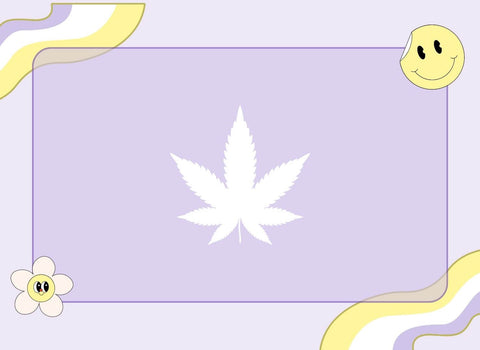
Consuming low-dose Delta 9 edibles seems to offer more health benefits than smoking, vaping, or other methods of consumption. That’s why everyone’s favorite Energy gummies, with only 2.5 mg of THC per serving, offer a safer way to experience the benefits of THC.
Keep reading to learn about the relationship between cannabis and serotonin syndrome.
What Is Serotonin?
Serotonin is a neurotransmitter: a type of brain chemical that helps send messages to and from neurons. It is made from an essential amino acid called tryptophan, which is produced in the brain and the intestines, with the majority of it being found in the gut.
Serotonin plays an essential role in regulating a wide range of bodily functions, like mood, hunger, sleep, and even memory and learning. What serotonin is best known for is that it helps you feel happy, which is why it's often called the "feel-good" hormone.
Low levels of serotonin can lead to physical or mental problems like anxiety, depression, bipolar disorder, and other mood disorders. A serotonin deficit is not good for our brain or our overall health, but neither are extremely high serotonin levels.
What Is Serotonin Syndrome?
Serotonin syndrome is a potentially life-threatening condition caused by excessive serotonin levels in the brain. High serotonin levels can lead to a range of symptoms from mild to critical:
Serotonin syndrome is most often caused by the use of substances that increase serotonin levels. These include prescription medications as well as illicit drugs.
- Selective serotonin reuptake inhibitors (SSRIs)
- Serotonin-norepinephrine reuptake inhibitors (SNRIs)
- Monoamine oxidase inhibitors (MAOIs)
- Tricyclic antidepressants (TCAs)
- Opioid medications such as Tramadol
- MDMA and ecstasy
- Cocaine
The more serotonin-increasing substances you use (and the longer you use them), the more at-risk you are for developing serotonin syndrome.
Still, serotonin syndrome is relatively rare and is associated with multiple serotonin-enhancing substances being used together or a substance being used in extremely high doses. For example, the majority of people who are on antidepressant medications do not develop serotonin syndrome.
What Are the Symptoms of Serotonin Syndrome?
Symptoms of serotonin syndrome can range from mild to severe. If not treated, severe symptoms can be fatal.
Mild symptoms typically include:
- Restlessness
- Increased heart rate
- Dilated pupils
- Loss of muscle coordination
- Sweating
- Diarrhea or other digestive problems
Severe symptoms of serotonin syndrome include:
- High fever
- Seizures
- Irregular heartbeat
- Unconsciousness
How Does Cannabis Affect Serotonin?
Cannabis and serotonin have an intriguing relationship. At low doses, THC and CBD may reduce symptoms of depression by boosting levels of serotonin in the brain. Paradoxically, higher doses seem to depress serotonin levels for many users.
A 2007 study found that cannabis is a double-edged sword when it comes to serotonin and mental health.
A new neurobiological study has found that a synthetic form of THC, the active ingredient in cannabis, is an effective antidepressant at low doses. However, at higher doses, the effect reverses itself and can actually worsen depression and other psychiatric conditions like psychosis.
Cannabis showed antidepressant-like effects by increasing the activity in serotonergic neurons, brain cells that modulate serotonin levels in the brain. According to researchers in the study, “low doses had a potent antidepressant effect, but when we increased the dose, the serotonin in the rat brain actually dropped below the level of those in the control group.”
The antidepressant-like effect of cannabis comes from its chemical similarity to natural substances in our brain called endocannabinoids.
What is The Endocannabinoid System?
The endocannabinoid system (ECS) is a network that regulates functions like sleep, mood, memory, appetite, and pain perception.
The ECS has two main components:
- Endocannabinoids. These are cannabinoids that our body naturally produces. They are the signals.
- Receptors. These receive the signals (cannabinoids) and initiate changes in the body.
THC, CBD, and other cannabis compounds are called phytocannabinoids—the prefix “phyto” meaning “derived from plants,” in this case cannabis. Having a similar chemical composition to the cannabinoids our bodies produce, Delta 9 THC docks with the ECS’s CB1 and CB2 receptors.
The interaction between THC and CB1 receptors increases serotonin and dopamine (another “feel-good” hormone), creating feelings of happiness and euphoria we typically call a “high.” However, as we’ve noted, higher doses of THC can suppress serotonin and dopamine in some people.
When consumed in sufficient doses, THC can get the user high. But don’t worry about getting high or experiencing any unpleasant side effects with our sub-psychoactive amounts of Delta 9 THC. With our low-dose Delta 9 edibles, the majority of users experience a mild euphoric kick and a plethora of therapeutic effects like pain relief, lowered stress, and improved mood.
Our Bliss Delta 9 gummies contain only 5 mg of THC, which produces a sweet euphoric release without overwhelming the senses.
Read all about Delta 9 THC and how it can improve your overall health.
Cannabis Compounds Work Together to Create the Entourage Effect
According to science, cannabinoids interact synergistically with one another and with the ECS to deliver even more benefits. This synergistic interaction of cannabinoids is called the entourage effect, and it proposes that cannabidiol (CBD) can enhance the properties of THC and vice versa. In the entourage effect, cannabis compounds work together to provide a more potent and positive effect than any of the individual components could produce alone.
CBD and THC might have more benefits for serotonin when taken together than in isolation. Unlike THC, CBD doesn’t bind to the cannabinoid receptors directly. Instead, it downregulates the effects of THC on CB1 and CB2 receptors.
In other words, when you take THC and CBD together, CBD may help to temper the psychoactive effects of THC by reducing its direct interaction with the cannabinoid receptors. According to Vučković, et. al., “CBD has little binding affinity for either CB1 or CB2 receptors, but it is capable of antagonizing them in the presence of THC.” Because it lacks psychoactive properties, CBD does not make cannabis users high.
Here’s an in-depth look at the differences and similarities between Delta 9 THC and CBD.
The best way to experience the entourage effect is by taking THC edibles with small amounts of THC, CBD, and other minor cannabinoids. We get the best results from our full spectrum CBD products by adding low amounts of THC (between 2 and 10 mg per gummy) and balanced concentrations of cannabidiol. This way, we ensure the potency and efficacy of our products.
Our Relax Plus gummies contain only 5 mg of THC, balanced by 25 mg of CBD. These watermelon-infused edibles make for the perfect evening escape.
The benefits of microdosing cannabis are numerous, and our gummies offer the most reliable, consistent way of experiencing the therapeutic potential of THC and CBD. However, consuming cannabis at higher doses may have the opposite effect on our health and serotonin.
Can Weed Cause Serotonin Syndrome?
There is no evidence that weed use causes serotonin syndrome on its own. However, it can potentially increase the risk of developing serotonin syndrome in people who are already taking SSRIs.
Some people use cannabis while also taking selective serotonin reuptake inhibitors. CBD and THC can interact with the metabolism of these antidepressant medications, potentially enhancing their effects, which can create a surplus of serotonin.
We recommend microdosing cannabis to avoid serotonin syndrome and cannabis toxicity.
What is Cannabis Toxicity?
Cannabis toxicity occurs when an individual consumes an excessive amount of cannabis, primarily THC.
The symptoms of cannabis toxicity can vary from mild to severe, and they can include:
- Anxiety
- Confusion
- Hallucinations
- Panic attacks
- Paranoia
- Seizures
- Coma
A 2020 case report revealed two cases in which cannabis toxicity seemed to point to nascent serotonin syndrome.
Psychotic states, cardiac toxicity, and neurotoxicity have been reported as clinical sequelae of THC-induced toxicity. Our cases show additional harmful side effects of highly concentrated THC when abused by adolescents in its vapor, or “dabbing” form. Although the cases did not show all of the hallmarks of a true serotonin syndrome, some overlap existed in physical exam findings.
This is why we strongly advocate for low-dose cannabis products, as high doses of THC over time are no joke.
All our edibles contain low amounts of THC (between 2 and 10 milligrams) combined with optimal dosing of CBD for the entourage effect. As long as you stick to low doses of Delta 9, you don’t need to worry about serotonin syndrome or cannabis toxicity.
Product QUIZ
Need help deciding what product is best for you? Take our quiz, just three questions until your perfect match!
Can CBD Lower Serotonin?
CBD can increase serotonin levels via interactions with 5-HT1A receptors. This might explain CBD’s potential anti-anxiety and antidepressant effects, as it can improve serotonin signaling in the brain.
Rats subjected to the spared nerve injury model for 24 days showed decreased 5-HT firing activity, mechanical allodynia, and increased anxiety-like behavior in the elevated plus maze test, open-field test, and novelty-suppressed feeding test. Seven days of treatment with CBD reduced mechanical allodynia, decreased anxiety-like behavior, and normalized 5-HT activity. (De Gregorio, et. al.)
Another study shows that cannabidiol can help lower depression, anxiety, and psychotic disorders by targeting 5-HT-1A receptors. In this regard, CBD can be seen as a potent antidepressant with broader applications and fewer side effects than traditional antidepressant medications.
Our edibles contain the purest hemp-derived cannabidiol in optimal ratios with THC. Take a peek at our collection of the best CBD gummies. Remember that the combination of CBD and THC gives the maximum results for mental, physical, and overall health. Shop our full spectrum CBD and THC gummies and find your ideal flavor profile.
Our Euphoria Sour gummies are a treat if you enjoy the tantalizing tart flavors on your palate. For a sweeter taste, try our Euphoria Strawberry gummies. Both flavors pack a mighty hit of 10 mg of THC and 10 mg of CBD.
Is Indica or Sativa Better For Serotonin?
Indica and sativa are the two main varieties of cannabis. Each strain has its own unique benefits and effects on users. Similarly, each strain is used for different reasons.
Indica strains are relaxing and calming. Typically high in CBD, indica promotes pain relief and full-body relaxation due to its strong anxiolytic and analgesic properties. It’s popular for nighttime use and can effectively improve the quality of sleep.
Sativa is said to be more invigorating, promoting creativity and boosting energy. It can stimulate brain function and productivity, so cannabis users often choose sativa during the day.
Combining the effects and benefits of both varieties, hybrid strains contain a balanced blend of THC and CBD. They can be indica-dominant or sativa-dominant, but both offer relief from pain, insomnia, and anxiety. A favorite hybrid blend is our most delicious Energy gummies. They combine 5 mg of CBD with only 2.5 mg of THC to offer a balanced mood improvement.
Check out the best weed strains for anxiety to learn more.
The Best THC Edibles to Boost Serotonin
To help you get more of the "feel-good” hormone, we've put together a list of our favorite THC edibles. We use only low amounts of THC and CBD to craft these delicious fruity bombs, so you don’t have to worry about serotonin syndrome.
- Our Relax Plus gummies might just be the top product for microdosing if you’re struggling with anxiety and depression. This mighty combo for enhancing relaxation contains 25 mg of premium CBD with a touch of hemp-derived Delta 9 THC.
- A slightly more balanced ratio of CBD and THC can be found in our Energy gummies. Only 2 mg of THC is paired with 5 mg of CBD, and with these low cannabis doses, serotonin syndrome doesn’t stand a chance. They are great for boosting energy and improving focus while delivering a hearty blood orange zest.
- Our Bliss gummies contain an equal ratio of THC and CBD (5 mg each in every scrumptious gummy), which makes these honeydew-infused bites a great way to soothe pain receptors, relax your sole muscles, and help you kick back after a long day. (Microdosing cannabis does offer sweet pain relief.)
Cannabis and Serotonin FAQ
Is Delta 9 legal in the US?
Our THC gummies are legal on a federal level since they are compliant with the 2018 Farm Bill. This means that Delta 9 THC must be derived from hemp, not marijuana (see the differences between marijuana and hemp here), and the THC content must not exceed 0.3% on a dry weight basis.
This makes all our products containing hemp-derived Delta 9 federally legal in the US. However, the legality of THC and CBD derived from hemp varies from state to state, so it’s always a good idea to check if Delta 9 is legal in your state.
Can smoking cause serotonin syndrome?
Mixing cannabis with antidepressants may increase the risk of serotonin syndrome. Serotonin syndrome typically arises from the use of certain drugs, including specific types of antidepressants like SSRIs, MAOIs, and TCAs. Cannabis affects serotonin, balancing it at low doses and having an erratic and unpredictable effect at high doses.
While smoking cannabis is a popular method of consumption, it is unreliable and delivers higher amounts of THC, which can have a destabilizing effect on serotonin levels.
Is weed an antidepressant?
Medical cannabis has been increasingly studied as a supplement to existing addiction therapies, including treatments for depression. Research found that adult cannabis users experienced a reduction in depressive symptoms with a single puff of recreational cannabis. Interestingly, those who received a mix of CBD and THC responded best.
Is weed good for anxiety?
Medical cannabis can help alleviate the symptoms of anxiety disorders. It modulates the endocannabinoid system, which plays a role in maintaining emotional homeostasis. CBD has soothing, anti-anxiety properties that help alleviate stress, while low amounts of THC can produce a mild euphoric experience without overwhelming the senses. That’s why microdosing cannabis is a great way to get rid of stress, alleviate anxiety, and improve mood. However, high-potency marijuana abuse can potentially exacerbate anxiety symptoms.
What weed is good for anxiety attacks?
Certain strains of medical cannabis are often reported to be beneficial for managing anxiety attacks. Indica strains are frequently recommended for their calming effects because they possess a higher ratio of CBD to THC compared to sativa strains. This higher concentration of CBD can help to temper the anxiety-inducing effects potentially associated with THC, providing a more relaxing and calming experience.
However, the experience can vary greatly depending on individual factors such as the person's tolerance, the cannabinoid and terpene profile of the plant, and the consumption method.
Learn more about specific Delta 9 strains and their effects.
Is sativa bad for depression?
Sativa strains are often associated with uplifting and energizing effects. They might help some people suffering from depression by enhancing their mood and motivation. However, cannabis strains aren’t a one-size-fits-all answer. Cannabis affects individuals differently, and while some may find relief with sativa strains, others might find them to exacerbate anxiety symptoms. The key is to consume cannabis in moderation and at low doses, as found in our delicious THC gummies.
What drug causes serotonin syndrome?
Certain types of antidepressants typically lead to excessive levels of serotonin and eventually serotonin syndrome. Antidepressants are medications that aim to increase serotonin levels. Commonly associated with serotonin syndrome are:
- Selective serotonin reuptake inhibitors (SSRIs)
- Serotonin-Norepinephrine Reuptake Inhibitors (SNRIs)
- Monoamine Oxidase Inhibitors (MAOIs)
- Tricyclic Antidepressants (TCAs)
These medications can lead to serotonin syndrome when taken in excessive amounts or mixed with other substances that increase serotonin. That’s why high-potency marijuana mixed with antidepressants may cause a spike in serotonin levels and lead to this condition.
The misuse of illicit drugs or drug abuse can also lead to serotonin syndrome. Monoamine oxidase inhibitors (MAOIs), a class of antidepressants that inhibit the enzyme monoamine oxidase from breaking down serotonin, could lead to an excess of serotonin when taken with certain foods or other medications, including cannabis.
In the case of suspected serotonin syndrome, emergency departments are equipped to handle the situation, which may present as a case of toxicity.
Which antidepressants do not cause serotonin syndrome?
While most antidepressants have the potential to cause serotonin syndrome when misused or combined with other serotonergic drugs, some are less likely to do so than others. For example, tricyclic antidepressants and monoamine oxidase inhibitors are generally considered to have a lower risk of inducing serotonin syndrome.
In contrast, when SSRIs or SNRIs are mixed with marijuana or other serotonergic substances, the potential risk of serotonin syndrome may increase.
Can smoking affect antidepressants?
Smoking marijuana can interact with antidepressants and potentially affect their efficiency. The specific effects largely depend on the types of antidepressants in question, the potency of the marijuana used, and the individual's unique physiological responses.
Substance abuse is an issue of growing concern in emergency medicine. When marijuana, particularly potent forms such as "dabs" from a dab pen, is used alongside antidepressants that inhibit serotonin reuptake, it may lead to unwanted side effects. Marijuana might either inhibit serotonin reuptake or act as a receptor agonist. This means that it may prevent the reabsorption of serotonin back into the neuron, thereby increasing the levels of serotonin available in the brain. If you mix marijuana and antidepressants such as SSRIs, it can cause symptoms, including dry mouth and rigidity in both lower extremities, among others.
These risks should be taken seriously, especially by individuals suffering from mental health disorders like depression and posttraumatic stress disorder, those undergoing medication-assisted treatment, and those in recovery centers or alcohol rehab.
Where can I buy Delta 9 THC for microdosing?
If you live in a state where medical marijuana is legal and you have a medical marijuana card, you can buy Delta 9 THC products at a cannabis dispensary near you.
If you don't have a medical marijuana card, don't live in a state where marijuana is legal, or don't want to drive to a Mary Jane dispensary, you can get our Delta 9 edibles delivered right to your door.
Check out this comprehensive guide to where to buy the best THC edibles in the country.
Resources
Study: Cannabis a double-edged sword. (2007, October 23). Newsroom. https://www.mcgill.ca/newsroom/channels/news/study-cannabis-double-edged-sword-27677
Vučković, S., Srebro, D., Vujović, K. S., Vučetić, E., & Prostran, M. (2018, October 15). Cannabinoids and Pain: New Insights From Old Molecules. Frontiers. https://doi.org/10.3389/fphar.2018.01259
Russo, E. B. (n.d.). Taming THC: potential cannabis synergy and phytocannabinoid-terpenoid entourage effects. PubMed Central (PMC). https://doi.org/10.1111/j.1476-5381.2011.01238.x
Baltz, J. W., & Le, L. T. (2020, March 2). Serotonin Syndrome versus Cannabis Toxicity in the Emergency Department. PubMed Central (PMC). https://doi.org/10.5811/cpcem.2020.1.45410
Gregorio, D. D., McLaughlin, R. J., Posa, L., Ochoa-Sanchez, R., Enns, J., Lopez-Canul, M., Aboud, M., Maione, S., Comai, S., & Gobbi, G. (2018, December 28). Cannabidiol modulates serotonergic transmission and reverses both allodynia and anxiety-like behavior in a model of neuropathic pain. PubMed Central (PMC). https://doi.org/10.1097/j.pain.0000000000001386
García-Gutiérrez, M. S., Navarrete, F., Gasparyan, A., Austrich-Olivares, A., Sala, F., & Manzanares, J. (2020, November 19). Cannabidiol: A Potential New Alternative for the Treatment of Anxiety, Depression, and Psychotic Disorders. MDPI. https://doi.org/10.3390/biom10111575
Stoner SA. Effects of Marijuana on Mental Health: Depression. Alcohol & Drug Abuse Institute, University of Washington, June 2017. URL: http://adai.uw.edu/pubs/pdf/2017mjdepression.pdf.
nama CBD FDA & Legal Disclaimer
Our products are not intended to diagnose, treat, cure, or prevent any disease. They are not a replacement for prescription medications and have not been evaluated by the Food and Drug Administration (FDA).
The information provided on this website does not, and is not intended to, constitute legal advice or any statement of the status of any laws. Any information, content, and materials available on this site are for general informational purposes only, and are not intended to be relied upon for any purpose.
Advice should be sought from the reader’s attorney with respect to any particular legal matter including decisions on what products are, or are not, legal to sell, possess, or consume. No reader, user, or browser of this site should act or refrain from acting on the basis of the information on this site without first seeking legal advice from their own counsel in the relevant jurisdiction.
Only your individual attorney can provide assurances that the information contained herein—and your interpretation of it—is applicable or accurate for your particular situation. Use of, and access to, this website or any of the links or resources contained within the site do not create an attorney-client relationship between the reader, user, or browser, and website authors, contributors, contributing law firms, or committee members and their respective employers.
More articles
About
Learn
Join us on this journey

© Copyright 2025 nama Products LLC. All Rights Reserved.
†These statements have not been evaluated by the Food and Drug Administration. These products are not intended to diagnose, treat, cure or prevent any disease. All information presented here is not meant as a substitute for or alternative to information from health care practitioners. Please consult your health care professional about potential interactions or other possible complications before using any product.
††The information provided on this website does not, and is not intended to, constitute legal advice or any statements of the status of any laws. Any information, content, and materials available on this site are for general entertainment purposes only, and are not intended to be relied upon for any purpose.
123 John Doe Street
Your Town, YT 12345
Store Hours
Sun: Closed
Mon-Fri: 9:00 - 17:00
Sat: 10:00 - 13:00
What to expect at pickup
Closed
Closing at 5pm
Closing at 5pm
Closing at 5pm
Closing at 5pm
Closing at 5pm
Closing at 1pm





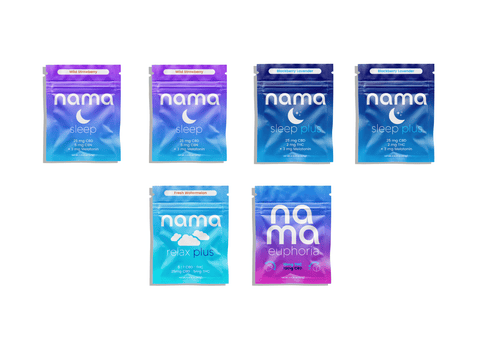
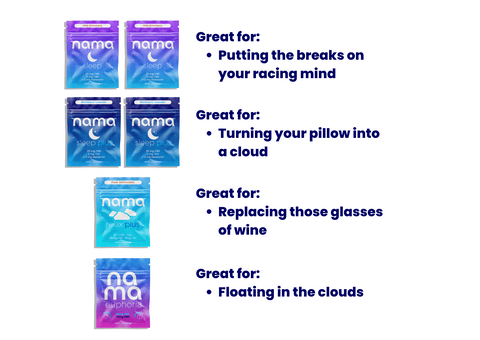
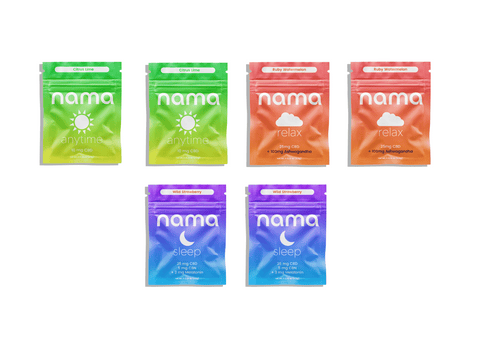
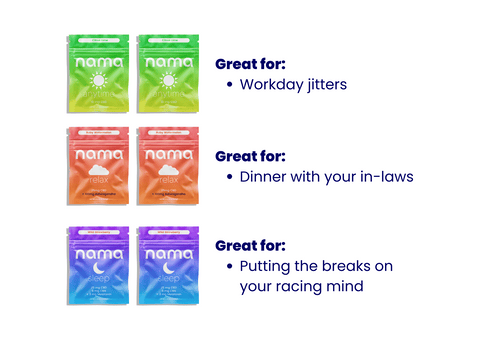
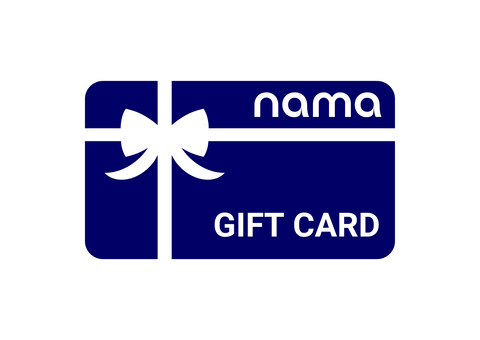







![Buzz Packs™ [THC and CBD Powder Drink Mix]](http://www.namacbd.com/cdn/shop/files/nama_buzz_packs_thc_drink_pack_white_background.png?v=1741884660&width=480)
![Buzz Packs™ [THC and CBD Powder Drink Mix]](http://www.namacbd.com/cdn/shop/files/Buzz_Packs_Label.png?v=1741884660&width=480)


![Buzz Drops™ [THC Drink Drops]](http://www.namacbd.com/cdn/shop/files/nama_thc_buzz_drops.png?v=1711412866&width=480)
![Buzz Drops™ [THC Drink Drops]](http://www.namacbd.com/cdn/shop/files/buzz-drop-wine-comparison.png?v=1736882023&width=480)


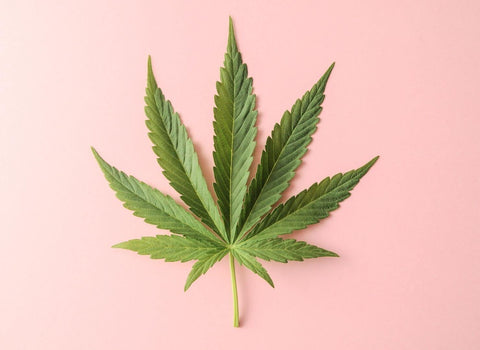
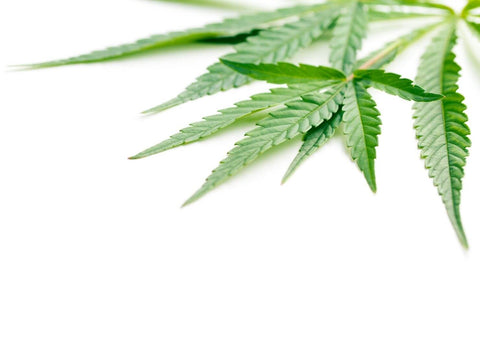


Comments (0)
There are no comments for this article. Be the first one to leave a message!